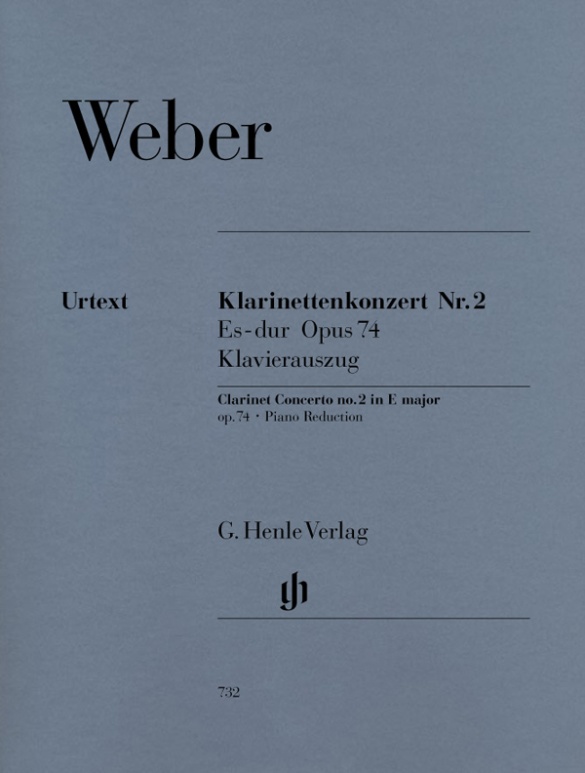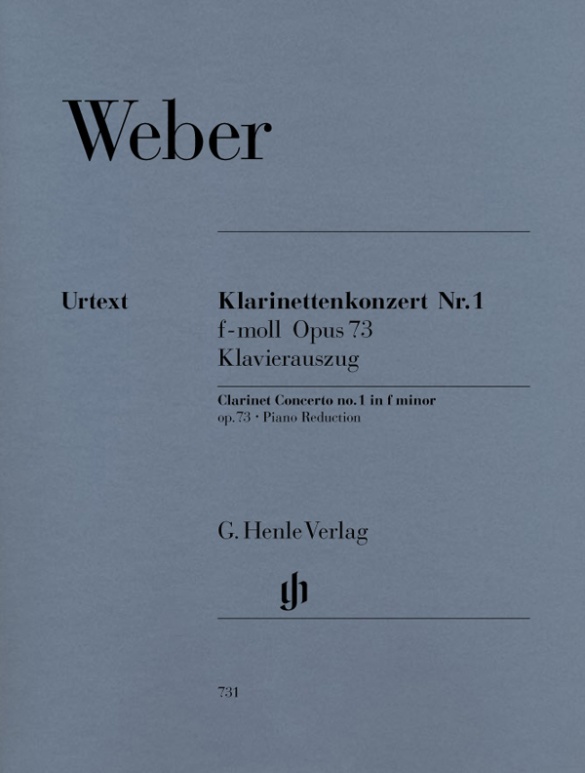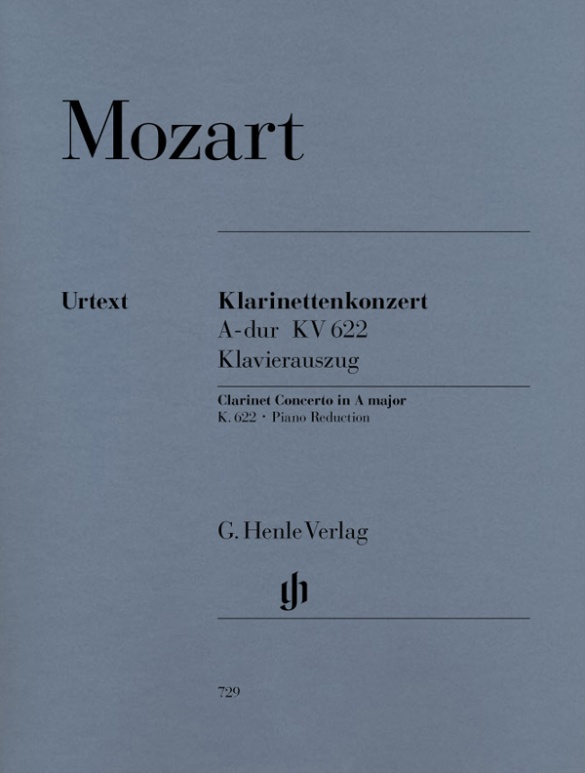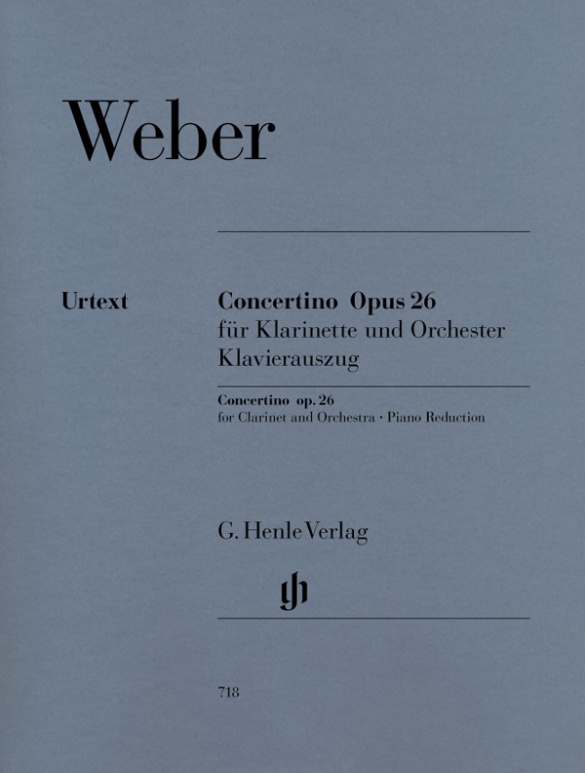

Carl Maria von Weber
Concertino op. 26 for Clarinet and Orchestra
This "hit" is even popular among learners! Now it opens Henle’s new series of Weber’s works for clarinet and orchestra in piano reduction. This edition includes two separate parts: the urtext of Weber’s version, and the widely known version by Carl Bärmann.
Content/Details
About the Composer
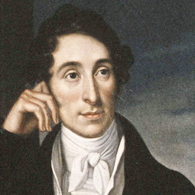
Carl Maria von Weber
One of the most important German opera composers before Wagner, he advocated for a German opera through his own output and in his writings. His fame is predicated on “Der Freischütz,” which was received emphatically as a German nationalist opera. His instrumental works (orchestral pieces, solo concerti, chamber music, piano works) are largely based on Classical models though already anticipate the Romantic sound.
| 1786 | Born in Eutin on November 18 or 19. Journeyman years with the “Webersche Schauspielergesellschaft,” a wandering acting troupe. He plays smaller roles for children. |
| 1797 | The troupe comes to Salzburg, where he studies composition with Michael Haydn from 1798. |
| 1800 | Premiere in Freiberg of his first Romantic, comic opera, “Das Waldmädchen” (“The Forest Maiden”). |
| beginning 1803 | Years of study in Vienna with Georg Josef Vogler. |
| 1804–06 | First appointment as music director in Breslau (Wrocław). |
| 1810 | Premiere in Frankfurt am Main of the Romantic opera “Silvana.” Piano Concerto No. 1 in C major, Op. 11. |
| 1811 | Clarinet Concerti No. 1 in F minor, Op. 73, and No. 2 in E-flat major, Op. 74, commissioned by Maximilian of Bavaria; in 1812, Piano Concerto No. 2 in E-flat major, Op. 32. |
| 1813–16 | Opera director and music director of the Estates Theater in Prague. From 1817 onward,courtl music director in Dresden. |
| 1819 | Piano pieces: “Rondo brillante” in E-flat major, Op. 62; “Aufforderung zum Tanze” (“Invitation to the Dance”) in D-flat major, Op. 65; “Polacca brillante” in E-flat major, Op. 72. Trio in G minor for piano, flute, and cello, Op. 63. |
| 1821 | Premiere in Berlin of his Romantic opera “Der Freischütz,” Op. 77; it is received as an archetypal German opera due to its subject matter and music, although it integrates German, French, and Italian elements. Konzertstück in F minor for Piano and Orchestra, Op. 79, which paves the way for one-movement concerto compositions in the nineteenth century. |
| 1823 | Premiere in Vienna of “Euryanthe,” Op. 81. |
| 1826 | Premiere in London of “Oberon.” Death in London on June 5. |
About the Authors

Norbert Gertsch (Editor)
Dr. Norbert Gertsch, born in 1967 in Rheinkamp/Moers, studied piano solo at the Mozarteum in Salzburg and read musicology and philosophy at the Paris Lodron University in Salzburg and the Ruperto Carola University Heidelberg on a scholarship from the “Studienstiftung des Deutschen Volkes”. In 1996 he wrote his doctoral thesis on Ludwig van Beethoven’s Missa solemnis (as part of the New Complete Edition) under Ludwig Finscher.
In the following year, he began to work at G. Henle Publishers, initially as an editor for electronic publishing. After working on a two-year project (1999–2000) sponsored by the German Research Foundation (DFG) preparing a new Beethoven Catalogue of Works, he became a scholarly editor at G. Henle Publishers. In 2003 he became Editor-in-Chief, in 2009 Deputy Managing Director and Head of Publishing. As of 1 January 2024, the Executive Board of the Günter Henle Foundation has appointed Dr. Norbert Gertsch, as the new managing director, succeeding Dr. Wolf-Dieter Seiffert.
Gertsch has published many Urtext editions for G. Henle Publishers, including volumes for a new edition of Beethoven’s Piano Sonatas together with Murray Perahia.

Johannes Umbreit (Piano reduction)
Prof. Johannes Umbreit studied the piano at the Musikhochschule in Munich. From 1987 onwards he was a regular accompanist at courses given by Wolfgang Schneiderhan, Thomas Brandis, Ljerko Spiller, Igor Ozim, Olga Woitowa, Ernő Sebestyén, Walter Nothas, F. Andrejevsky, Denis Zsigmondy and Zakhar Bron amongst others. He has appeared in numerous radio and TV broadcasts and plays chamber music with members of the Bavarian State Orchestra, the Munich Philharmonic Orchestra and the Bavarian Radio Symphony Orchestra.
He is on the jury of different international competitions and has been invited to several international music festivals. Umbreit was a teacher for almost ten years at the Musikhochschule in Munich and at the same time a lecturer for chamber music and piano accompaniment at the Richard Strauss Conservatory. Since 2008 he has been a lecturer at the Hochschule für Musik und Theater München. As the long-serving managing director of the Richard-Strauss-Gesellschaft, he was made an honorary member of the board in 2009. In May 2011, the Bavarian Minister of Culture appointed Johannes Umbreit an honorary professor of the Hochschule für Musik und Theater München on the suggestion of its academic senate.
Product Safety Informations (GPSR)

G. Henle Verlag
Here you can find the information about the manufacturer of the product.G. Henle Verlag e.K.
Forstenrieder Allee 122
81476 München
Germany
info@henle.de
www.henle.com
Si tratta di una importante e quasi definitiva edizione a stampa che i clarinettisti più attenti dovrebbero consultare per operare delle scelte esecutive consapevoli.
I Fiati, 2003recommendations
autogenerated_cross_selling
Further editions of this title
Further editions of this title


